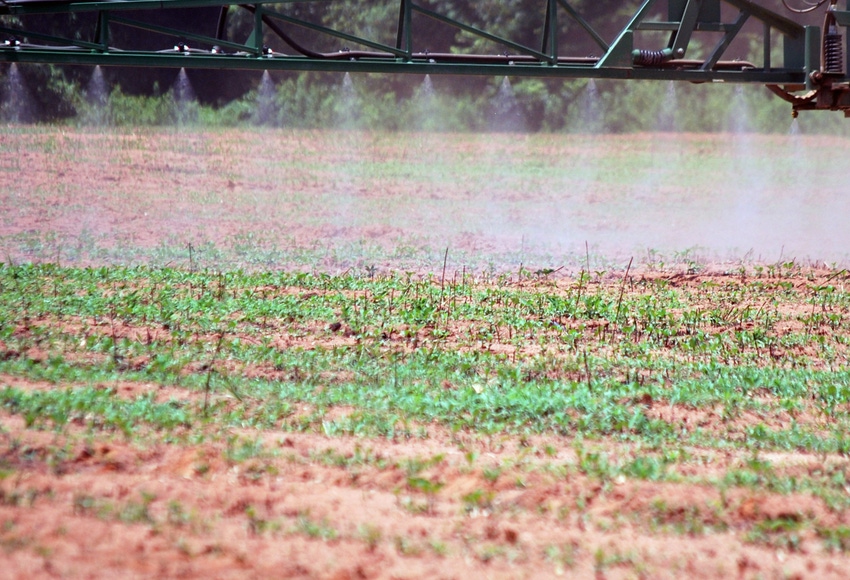
On Wednesday morning (Sept. 20), information on a second dicamba-related petition – this one from Arkansas farmers – was released to the public. The package was sent to the Arkansas State Plant Board a day earlier.
The Plant Board plans to meet Thursday (Sept. 21) to discuss the latest round of issues facing state agriculture with dicamba-tolerant crops. The meeting follows a Monsanto petition to set aside a task force’s recommendation to go with an application cut-off date of April 15 for the 2018 growing season. That recommendation has since been backed by the Plant Board’s Pesticide Committee.
Growers gather
Jasper, Ark., producer Perry Galloway has never shied away from his support of Xtend crops. That support is understandable as pigweed is a major nemesis on his operation. One of the few to top 100 bushels in the state’s soybean yield contest, Galloway is also an aerial applicator.
“I’ve been involved with (the dicamba situation) since Day One, tried to make all the Plant Board meetings, all the task force meetings , all of that.
“Anyway, there’s a group of seven of us who have begun a grassroots campaign. As farmers we just said it was time to join together on this. We met last Thursday night (September 14) and began with a letter we drafted that centers around some possible middle-ground solutions to the dicamba issue other than the recommendations already made.”
The letter’s recommendations:
No sale or use of any DMA or DGA dicamba formulations statewide for crop applications, in-season or burndown, with the exception of XtendiMax, Fexapan or Engenia, which is a BAPMA formulation.
We propose cut-off dates consisting of zones ranging from April 15 to May 25 based on north/south geographies.
No applications before 8 a.m. or after 4 p.m. after May 15 or anytime the ambient temperature exceeds 88 degrees after April 15.
A one-mile buffer in any direction of a susceptible crop unless it’s the grower’s own crop or he/she has a written waiver from all concerned parties. These waivers will need to be filed with the Arkansas State Plant Board.
A very restrictive special use permit to apply in extreme cases. The Plant Board would monitor these applications.
A website using FSA CLU (Farm Service Agency Common Land Unit) maps to document the planting and dicamba usage on all Xtend crops. This technology is available. This information would be available or public viewing.
A fee on Xtend seed and labeled dicamba herbicide sales should be considered to aid in the funding of the Arkansas State Plant Board.
A minimum of $1 million of liability insurance to cover overspraying. The policy should be provided to the Plant Board as a condition to buy or apply dicamba.
Enhanced training as determined by the Arkansas State Plant Board and University of Arkansas Extension.
Increased fines of $25,000 per incident for serious label violations with a lower standard of proof as proposed by the Agricultural Council of Arkansas.
The letter wraps up with, “We realize these ideas will not satisfy all parties. We are merely trying to facilitate a compromise. This will not satisfy everyone but could be workable for the 2018 crop year.”
The petition
A day after the letter was written, the seven signers “started a petition simply asking for the Plant Board and lawmakers to consider other options,” says Galloway. “Now, whoever has signed on to the petition doesn’t necessarily agree with everything in the letter. That letter – again, it’s only floating some ideas to explore -- only has the hard signatures of the original seven.
“As of just a minute ago, the petition now has in the neighborhood of 325 signatures representing almost 1.25 million acres in the state. These farmers, representing almost all of the 36 soybean-producing counties in Arkansas and backing around 25 percent of the row-crop acres in Arkansas, are in support of the use of dicamba.”
The petition sign-ups “took off like a shot and it surprised us. My phone won’t quit ringing with farmers wanting on this petition list – the response has been tremendous.”
What does the petition back? According to the press release, “In support of the continued use of Dicamba herbicides in 2018, past the proposed April 15th cutoff date, the signatories to the open letter to the State Plant Board suggest that:
1) The restrictions on the use of dicamba technology, currently proposed by the Dicamba Task Force, will certainly result in financial losses and economic damage to row crop farmers in Arkansas. In experience, alternative platforms for the management of pigweeds are not competitive with the available dicamba-based technology.
2) While well-intentioned, the Arkansas Dicamba Task Force was not representative of the majority of Arkansas row crop producers and these producers’ concerns were not adequately addressed.
3) Palmer Amaranth (pigweed) is a major problem for Arkansas row crop producers and the Arkansas State Plant Board should not be the only state in the South where dicamba technology is taken from farmers. The signatories to the attached letter believe that a May 25 cut-off date and a 1-mile buffer for application would have greatly reduced or eliminated nearly all the injury that occurred in Arkansas, during the 2017 crop year.”
On the ground
Harvest is now in full swing around the Mid-South.
“It doesn’t look like soybean yields have been damaged (by alleged dicamba symtoms)," says Galloway. "That is great but doesn’t mean this technology doesn’t have issues. Period. I’ll be the first to say: I support this technology but it has issues that need resolution. I don’t care if it effects yield, or not, the fact that it seems to be volatile is unacceptable long-term. There is no farmer including myself who wants to hurt our neighbor or neighbors.”
It’s interesting you’re willing to use the word ‘volatile.’ No one on the company side seems willing to use it.
“Yeah, they don’t want to use it. But I think the vast majority of farmers agree (the new formulations) have slight volatility issues. They may not want to use that word because of the legal implications since they claimed it was non-volatile or very low volatility. But if it is volatile, at least to some extent and non-Xtend soybeans are so susceptible it shows up. Again, that isn’t acceptable.”
Even so, Galloway insists “we can’t throw this technology out with the dishwater. Rattle around the numbers. Monsanto originally expected an 80 adoption rate in five years and now they’ve changed that to three years. Eighty percent of the beans grown in the United States are going to be Xtend or dicamba-tolerant?
“And Arkansas, out of the 34 soybean-producing states, is the only one that’s either smart enough that we don’t need the technology or not intelligent enough use it. What are we?”
Any idea where the petition signers are from? Any sign-ons from the east side of Crowley’s Ridge?
“Yeah, the majority of them, but again, almost all Arkansas soybean-producing counties are represented on this petition,” he notes. Mississippi County – often described as ground zero for dicamba off-target problems – is “well-represented” in the petition, says Galloway.
On Galloway’s Xtend contest fields…
“I’ll have Xtend varieties in the yield contest this year – Xtend varieties are about all I planted. They look great. It’s too hard to predict before the combine runs but this looks to be the best soybean crop we’ve ever had.
“And the USDA raised the expected soybean yield for Arkansas to 51 bushels. That would be a record crop in spite of all the alleged damage.”
Later cut-off date?
In Galloway’s eyes, what would be the most logical outcome to the latest maneuvers assuming everyone is willing to reconsider?
“That’s easy: a later cutoff date. An April 15 cutoff has been proposed. But if you look at the data, the big-time allegations didn’t start showing up until mid-June. Until then, yes, there were a few complaints but they were in the single digits weekly. June 15 is when the real ramp-up for complaints began.
“So, if you allow two weeks for symptoms to show up, those damage complaints came from applications made in extremely late May/early June. So, this year, prior to June 1 would have been the safer application window on the calendar. The temperatures at that time were cooler and overall conditions for application were better.
“So, if there’s a cutoff date it needs to be closer to June 1.”
Galloway is also in support of increased civil penalties for “egregious” spraying violations. “They need to define ‘egregious’ though. If someone makes an application out of desperation, after all other avenues have been exhausted, and that application doesn’t affect anyone, is that ‘egregious’? I don’t know but, in my opinion, it needs to be spelled out.
Another consideration is increased education “on how to properly use these products and this technology. They made a stab at educating the applicators this season but I think more needs to be done on that front.
"How about considering different buffer zones? We can work with a mile buffer but I prefer a half-mile.”
A permitting system is another proposal in the letter. “The Plant Board has referred to the current regulations concerning 2,4-D, rice and cotton in guiding some dicamba regulation. That’s fine, but there is a lot more to it than simply a one-mile buffer zone. There are actually two-and-a-half pages in the regulation book addressing this, including exceptions and permits with neighbors consent. This should be looked at more closely.”
Regardless, says Galloway, “the cat’s out of the bag. Now, growers know this technology works and can work great. Right now, there is one new formulation available in the state. Hopefully, all three products will available in 2018. That would provide a way to access a paper trail because the retailer will know what farmers bought” the new dicamba formulations.
About the Author(s)
You May Also Like






